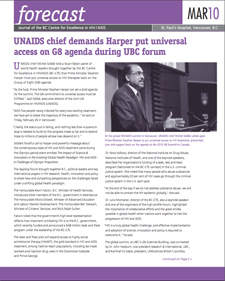 UNAIDS chief demands Harper put universal access on G8 agenda during UBC forum
UNAIDS chief demands Harper put universal access on G8 agenda during UBC forum
UNAIDS chief Michel Sidibé told a blue-ribbon panel of world health leaders brought together by the BC Centre for Excellence in HIV/AIDS (BC-CfE) that Prime Minister Stephen Harper must put universal access to HIV therapies back on the Group of Eight (G8) agenda.
“As the host, Prime Minister Stephen Harper can set a bold agenda for the summit. The G8 commitment to universal access must be fulfilled,” said Sidibé, executive director of the Joint UN Programme on HIV/AIDS (UNAIDS).
“With five people newly infected for every two starting treatment, we have yet to break the trajectory of the epidemic,” he said on Friday, February 26 in Vancouver.
“Clearly, the status quo is failing, and nothing less than a quantum leap is needed to build on the progress made so far and to extend hope to millions of people whose lives depend on it.”
Sidibé’s forceful call to Harper and powerful message about the contemporary state of HIV and AIDS treatment came during the Olympic-period event entitled The Impact of Science & Innovation in the Evolving Global Health Paradigm: HIV and AIDS – A Challenge of Olympic Proportion.
The daylong forum brought together B.C. political leaders and key international players in HIV
research, health, innovation and policy to share new and compelling perspectives on the challenges faced under a shifting global health paradigm.
The Honourable Kevin Falcon, B.C. Minister of Health Services, introduced other members of the B.C. government in attendance: The Honourable Moira Stilwell, Minister of Advanced Education and Labour Market Development; The Honourable Ben Stewart, Minister of Citizens’ Services; and MLA Ralph Sultan.
Falcon noted that the government’s high-level representation reflects how important combating HIV is to the B.C. government, which recently funded and announced a $48-million Seek and Treat program under the leadership of the BC-CfE.
The Seek and Treat pilot will expand access to highly active antiretroviral therapy (HAART), the gold standard in HIV and AIDS treatment, among hard-to-reach populations, including sex trade workers and injection drug users in the Downtown Eastside and Prince George.
Dr. Nora Volkow, director of the National Institute on Drug Abuse, National Institutes of Health, and one of the keynote speakers, described her organization’s funding of a seek, test and treat program (fashioned on the BC-CfE concept) in the U.S. criminal justice system. She noted that many people who abuse substances and approximately 20 per cent of HIV cases go through the criminal justice system in the U.S. each year.
“At the end of the day if we do not address substance abuse, we will not be able to contain the HIV epidemic globally,” she said.
Dr. Julio Montaner, director of the BC-CfE, also a keynote speaker and one of the organizers of the high-profile forum, highlighted the importance of collaborative efforts and the great strides pos
sible in global health when nations work together to halt the progression of HIV and AIDS.
“HIV is a truly global health challenge, and effective implementation and adoption of science, innovation and policy is required to overcome it,” he said.
The global summit, at UBC’s Life Sciences Building, was co-hosted by Dr. John Hepburn, vice president research & international, UBC, and Karimah Es Sabar, president, LifeSciences British Columbia.
At the global HIV/AIDS summit in Vancouver, UNAIDS chief Michel Sidibé called upon Prime Minister Stephen Harper to put universal access to HIV treatment, prevention, care and support back on the agenda at the 2010 G8 Summit in Canada.
